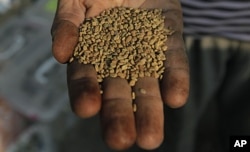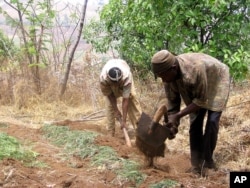Cameroon’s dependence on food imports has skyrocketed over the last three decades. The Ministry of Finance says last year alone, the country spent about $1.1 million on imports of rice, fish, flour, sugar and other products. That’s about five percent of the national budget.
Agricultural specialists attribute the decline to low levels of investment in agriculture and in rural areas in general. Eighty percent of the population is composed of rural dwellers whose main occupation is farming.
But the government allocates less than 2.5 percent of the national budget to rural development. As a result of the neglect, roads from farms to markets are crumbling, making the distribution and marketing of food nearly impossible.
High Cost of Inputs
The agricultural sector is also plagued by the high cost of inputs like seeds and fertilizers, a lack of conservation infrastructure, such as warehouses to stock harvests before the market, and outdated farming practices that limit productivity. For urban consumers, it’s cheaper to buy imports than to buy locally grown foods.
Godfred Mututu Awa is the government’s regional delegate for agriculture and rural development in Cameroon’s northwest. Injecting more money into the rural sector will significantly reduce the problem according to Mututu. .
“ If we must survive and not depend on other countries," said Mututu, "we must know that this is a vital sector and it needs a lot of financing. This is the only sector that can create job opportunities for children. What share of our national budget goes to agriculture? If we consider it a priority sector, it means other sectors must find the money to pump into agriculture and guarantee food for the rapidly growing population of this country.".
It has not always been this way
In the 1970s and ‘80s, Cameroon produced enough food to feed itself and to export. That changed when an economic crisis began in 1986. The emphasis on agriculture dropped as the demand for oil increased.
Prices for exports slumped on the world market. Government subsidies to farmers evaporated and agricultural development programs collapsed. Farmers looked elsewhere for sources of income and poverty increased in the rural areas, with large numbers of people relying on foreign food aid.
In February 2008, thousands of hungry Cameroonians poured into the streets in growing unrest. Government statistics reported 40 dead, but civil society activists said some 140 protesters were killed in the riots that swept across the country. The government reacted by announcing a $1 million to improve food production in two years.
But three years later, critics say not much has changed. Food prices remain beyond the reach of average Cameroonians and once again, tension is on the rise.
Experts say the entire agricultural system is in urgent need of an overhaul. Professor Jacob Ngeve Ebua is general manager of the Institute for Agricultural Research and Development, IRAD. He says Cameroon is utilizing only 12 percent of the arable land for food crop production.
“If we can double the surface area cultivated," explained Eluba, "then we shall have food surpluses. The land tenure systems are so complex. We’re still dealing with smallholder farmers who plant less than one hectare. Mechanization has to be improved so that farmers can organize themselves into cooperatives and hire agricultural machines like tractors to be able to plant large plots of land.".
In January, President Paul Biya announced a new plan boost food production. The president is seeking reelection this year after nearly 30 years in power. Among the measures are the creation of a specialized farmers’ bank to provide cheap loans, an agency to monitor food availability and a tractor assembly plant.
But critics say the measures do not go far enough. According to Albert Njonga an agronomist and leader of the 11,000-member Association for the Defense of Collective Interests, (ACDIC), all logical solutions should center on a 2007 World Bank report.
He says it prescribes agriculture as a launching pad for sustained economic growth through increased direct subsidies to the small farmers in rural communities. The most productive farmers would get the biggest shares.
"The poor farmers do not trust banks," he said, "some of which have recently collapsed on short notice. They also lack the capital to purchase tractors, subsidies for costly fertilizers and pesticides will significantly encourage production.”
As food prices spike worldwide, experts warn Cameroon’s heavy dependence on imports makes it increasingly vulnerable to external price fluctuations that could trigger another wave of unrest by hungry people.





